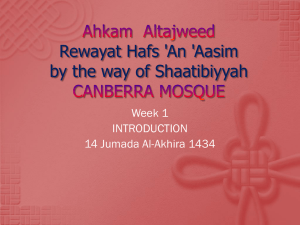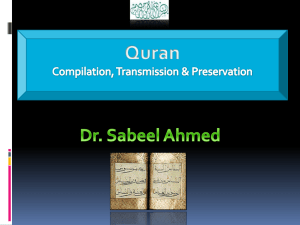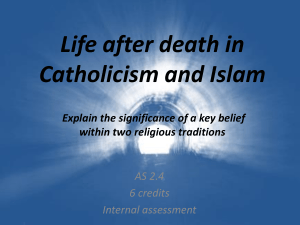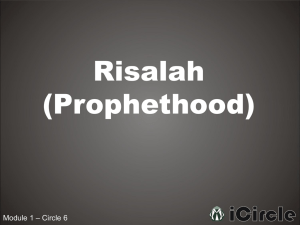Memorization of Quran
advertisement
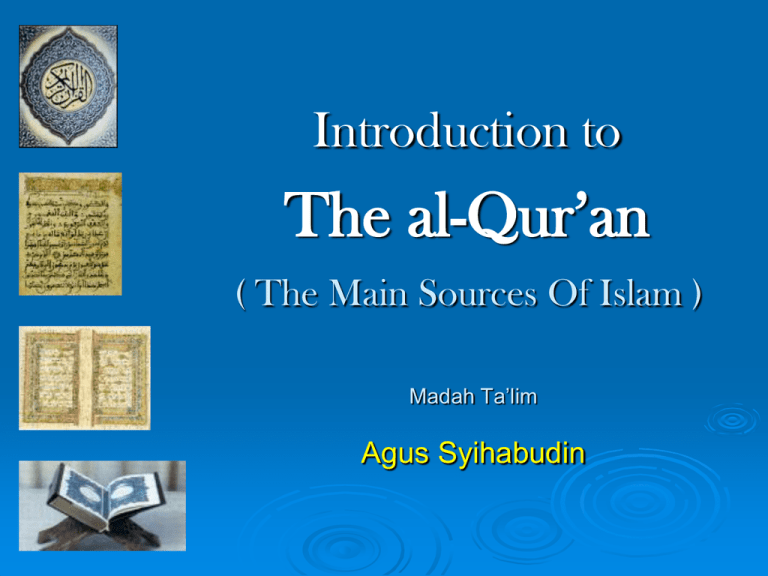
Introduction to The al-Qur’an ( The Main Sources Of Islam ) Madah Ta’lim Agus Syihabudin Belief True piety is this: to believe in God, and the Last Day, the angels, the Book, and the Prophets, to give of one’s substance, however cherished, to kinsmen, and orphans, the needy, the traveler, beggars, and to ransom the slave, to perform the prayer, to pay the alms. (Surat al-Baqara, 177) Linguistic Meaning Quran root word is QARA’A meaning read or recite. Hence, Quran means “the reading” or the “recitation” And (it is) a Quran which We have divided (into parts), in order that you might recite it to men at intervals 17:106 Islamic Meaning The Quran is the Arabic Speech of Allah, which He revealed to Prophet Muhammad in wording and meaning, and has been preserved in the mushafs, and has reached us by mutawaatir transmission, and is a challenge to mankind to produce something similar to it. Names of the Quran Quran (recitation) mentioned 73 times 17:88 Kitab (book) mentioned 77 times (2:1-2) Furqan (Criterion) 4 times Dhikr (Reminder) mentioned 55 times Tanzeel (Revelation) over 140 times The Beginning of Revelation Proclaim! (or Read!) In the name of thy Lord and Cherisher, Who created Created man, out of a (mere) clot of congealed blood: Proclaim! And thy Lord is Most Bountiful He who taught (the use of) the pen Taught man that which he knew not. (Surat al-‘Alaq, 1-5) The unmediated word of God 114 chapters 6207 verses 77,934 words 323,671 letters revealed over 22 years (22 y, 2 m and 22 d) Not arranged in the order in which it was revealed Traditionally thought to have been collected under ‘Uthman (d. 656), third caliph Today’s text based on the 1925 Egyptian edition Compilation of the Quran 1st compilation by Abu Bakr in 12 AH after the Battle of Yamaamah 2nd compilation by Uthman 24-25 AH The Oldest Quranic Manuscripts Content of the al-Qur’an Main themes: Creed or matters of Belief (Aqeedah) Stories and History Laws Legal material of the Quran is contained in about 500 Ayats Meccan-Madinan Phases Larger part of the Quran was revealed in Mecca - mostly deal with beliefs, disputation with unbelievers and their invitation to Islam Madinan surahs deal with legal rules regarding family, society, politics, economics, etc. Inimitability Of the Quran The Quran is considered the Greatest miracles And if you are in doubt concerning that which We have sent down to Our slave, then produce a chapter of the like thereof and call your witnesses (supporters and helpers) besides Allah, if you are truthful. Five verses: 2:23-24,10:38,11:13,17:88 52:33-34 7 BUKTI KEMUKJIZATAN AL QUR’AN 1. Bahasa Arab yang indah dan menakjubkan 2. Menceritakan sejarah dan menggambarakan prediksi kehidupan secara akurat 3. Isyarat IPTEK yang sejalan dengan penemuan mutakhir 4. Membawa ajaran kehidupan yang benar, adil dan menjamin kedamaian hidup 5. Diturunkan kepada seorang Nabi yang Ummi 6. Proses penurunan dalam skala waktu lama yang menjamin mudah terdeteksinya kepalsuan jika ia bikinan manusia 7. Mendapatkan garansi pemeliharaan Allah SWT QURAN & SCIENCE HUMAN EMBRYO, FLIES, ORIGIN OF THE UNIVERSE, EXPANSION OF THE UNIVERSE, ON IRON, SENSORY CHARACTERISTICS OF THE SKIN, ON BOTANY, THE CONSTITUENTS AND PRODUCE OF MILK, ABOUT THE CLOUDS, THE RIVERS, THE FUNCTION OF THE FOREPART OF THE HEAD See http://www.islam-guide.com/ & http://www.quranandscience.com/miracle s.html PERBEDAAN QUR’AN DAN QANUN Suatu hukum mewarisi karakteristik pembuatnya - Karakter manusia itu lemah (tidak sempurna) - Klaim kekelanan Qanun bertentangan dengan fitrah si pembuatnya 2. Suatu hukum dibuat berdasarkan kebutuhan - Kebutuhan manusia bersifat dinamis (berubah) - Qanun harus berubah seiring dengan dinamika 3. Suatu hukum dibuat untuk mengatur hidup supaya tertib - Kalau hidup sudah tertib, tidak perlu hukum 1. ASAS PEMBENTUKAN HUKUM 1.TAQLIL AL TAKALIF (QS. 7:157) 2. ‘ADAM AL HARJ - Menggugurkan suatu kewajiban - Mengurangkan - Mendahulukan - Membelakangkan - Mengganti - Mengubah Cara ‘- Rukhshah 3. AL TADARRUJ FI AL TASYRI; A Gradual Revelation Wisdom behind gradual revelation 1. To strengthen resolve 25:32 2. To simplify memorization and understanding 3.) To prove the truthfulness of the Prophet 25:33 4.) To prove the miraculous nature of the Quran 4:82 5.) To reveal the laws of Islam Preservation of the Quran ۡ ۡ ِّ ُ َ َ َّ َ َن َ إِ َّنا َن ۡحنُ َن َّزلنا ٱلذك َر ََإِنا ل ُُ ۥ ل َح ٰـ ِفظ “Verily, We have revealed the Reminder, and verily We shall preserve it.” (15:9) Compilation of Quran Why wasn’t it compiled during the life of the Prophet? The Quran was written down in totality but the Prophet didn’t order that it be compiled between two covers No pressing need Quran continued to be revealed…last verse nine days before death Quran not in chronological order Memorization of Quran And We have indeed made the Quran easy to understand and remember, then is there any one who will remember (or receive admonition)? (54:17) “It will be said to the companion of the Quran: Recite and rise in status, recite as you used to recite in the world, for your status will be at the last verse that you recite.” (Abu Dawood) Memorization of Quran The Prophet said: “Learn the Quran, preserve it, and recite it in a beautiful, musical manner, because it is swifter in escaping (from your memory) than the camels are from their hobbles. [Musnad Ahmad] Sciences of the Quran Asbab al-Nuzul (Occasion of Revelation) Asbab al-Nuzul or events which are related to revelation of the Ayats Hukm (law) is not limited to the events or circumstances. Asbab al-Nuzul helps to understand the Quran and its law. Sciences of the quran Benefit of Knowing Occasion of Revelation To understand the circumstances in which a verse was revealed To apply verses in a proper manner To know the person who caused the revelation Sciences of the quran Abrogation (al Naskh) And when We change a Verse in place of another, and Allah knows best what He sends down, they (the disbelievers) say: "You are but a forger/ liar)." 16:101 Example: Ruling on Alcohol 2:219 (harmful), don’t pray drunk (4:43), prohibited (5:90) Sciences of the quran Abrogation (al-Naskh) Benefits of this knowledge Understand and implement Quran properly Knowledge of gradual revelation of shariah Defense of Quran and Sunnah Sciences of the quran Recitation Tajweed: Science of the recitation of the Quran Ten different recitation of the Quran Young boy Indonesian American Kuwaiti Saudi Egyptian Sciences of the quran Exegeses (al-Tafsir) “The process of understanding Qur’anic texts.” 1) Tafsir bil ma’tsur – based on reports deriving from the Qur’an, the Prophet, the Companions 2) Tafsir bir ra’yi – based on ijtihad (reasoning) Hermeneutics discourse of contemporary exegetes: The Qur’an is not to be treated as a ‘dead’ text, but as a living text with spirit for transformation. Virtue of the Quran “The best of you is he who learns the Quran and teaches it to others” (Bukhari) “I have certainly left among you two matters, that if you adhere to them, you will never be misguided: the book of Allah and the Sunnah of His prophet” (Malik) Virtue of Quran And if there had been a Quran with which mountains could be moved (from their places), or the earth could be cloven asunder, or the dead could be made to speak (it would not have been other than this Quran). But the decision of all things is certainly with Allah. Have not then those who believed yet known that had Allah willed, He could have guided all mankind? 13:31 The neglect of the Quran Furqan: 30 Avoiding listening to its recitation, beliving in it or paying attention to it Avoiding acting by and respecting what the Quran states as halal and Haram Avoiding accepting the Quran as an arbiter Avoiding pondering over it Avoiding using it as a cure for the diseases of the heart Reaction to the Quran Embraced Islam Listening to it secretly themselves Claimed it was magic (Story of Waleed p.269) Normative Basis of Shariah: Maqashid Shariah (Overall Goal) – Imam Shatiby Basic human rights in Islam – Al Kulliyatul Khoms Right for protection of one’s faith Right for protection of one’s life Right for freedom of thoughts Right for protection of one’s property Right for protection of progeny ‘God loves to see that His concessions are taken advantage of, just as He hates to see the commission of a sin.’ (Hadith) ‘Fulfill your duties to the extent of your ability.’ (Hadith)

